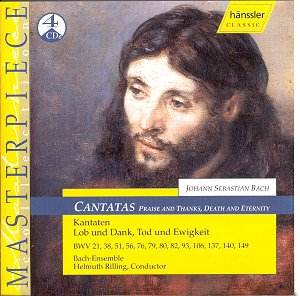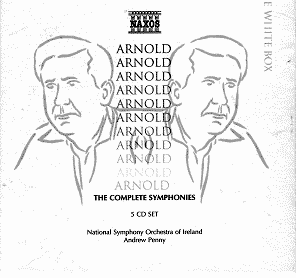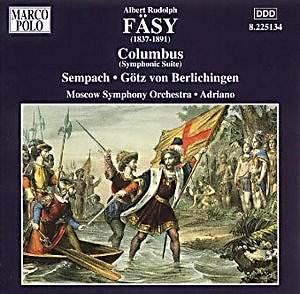 Composer: Johann Sebastian Bach
Composer: Johann Sebastian Bach
Works: BWV 21: Ich hatte viel Bekümmernis; BWV 38: Aus tiefer Not schrei ich zu dir; BWV 51: Jauchzet Gott in allen Landen; BWV 56: Ich will den Kreuzstab gerne tragen; BWV 76: Die Himmel erzählen die Ehre Gottes; BWV 79: Gott der Herr ist Sonn und Schild; BWV 80: Ein feste Burg ist unser Gott; BWV 82: Ich habe genug; BWV 93: Wer nur den lieben Gott laut walten; BWV 106: Gottes Zeit ist die allerbeste Zeit; BWV 137: Lobe den Herren, den mächtigen König der Ehren; BWV 140: Wachet auf, ruft uns die Stimme; BWV 149: Man singet mit Freuden vom Sieg
Performers: Arleen Auger, Nancy Amini, Eva Caspo (sopranos); Gabriele Schrekenbach, Julia Hamari, Helen Watts, Karen Hagermann, Ann Murray, Mechtild Georg, Hanna Schwarz (altos); Adalbert Kraus, Lutz-Michael Harder, Douglas Robinson, Aldo Baldin (tenors); Philippe Huttenlocher, Walter Heldwein, Sigmund Nimsgern, Wolfgang Schöne, Norman Anderson, Dietrich Fischer-Dieskau (basses); Gächinger Kantorei Stuttgart; Indiana University Chamber Singers; Bach-Collegium Stuttgart; Württemberg Chamber Orchestra
Recording: Conducted by Helmuth Rilling, recorded in Stuttgart and Heidelberg, 1975-1984
Label: Hänssler Classic 94028 [4CDs: 73.13, 76.25, 78.19, 69.25]
Bach’s cantatas are not merely sacred works; they are a profound exploration of the human condition through the prism of faith, emotion, and the German Baroque aesthetic. This comprehensive four-CD set, under the baton of Helmuth Rilling, encapsulates a significant portion of Bach’s output for these liturgical masterpieces, recorded between 1975 and 1984. The selection ranges from the deeply introspective BWV 56 to the jubilant BWV 51, each chosen not merely for their individual merit but also for their role in painting a broader picture of Bach’s theological and musical landscape.
Rilling’s interpretative choices remain a focal point of discussion. While his approach has been critiqued as somewhat traditional when juxtaposed against modern, historically informed performance practices, there is a distinctive merit to his style that resonates throughout this recording. Rilling’s tempos are judiciously chosen, allowing for a buoyancy and clarity that breathes life into the intricate counterpoint of Bach’s writing. For instance, in the opening chorus of BWV 80, “Ein feste Burg ist unser Gott,” Rilling opts for a robust orchestral sound that engulfs the listener, creating a sense of grandeur that matches the text’s proclamatory nature. Critics may argue that this approach sacrifices some of the briskness found in contemporary renditions, yet Rilling’s orchestration allows for a lush sonority that highlights the choral textures and orchestral dialogues.
The performances themselves are marked by a distinguished roster of soloists, including the extraordinary Arleen Auger. Her interpretation of BWV 51 stands out, characterized by a lightness of timbre and a refined articulation that conveys both the joy and complexity of the work’s text. Equally noteworthy is Dietrich Fischer-Dieskau, whose contributions in BWV 56 and BWV 82 are imbued with a gravitas that is unmistakably his own. His voice, while perhaps a touch mannered in this context, brings a depth of emotion that is deeply affecting, especially in the aria “Ich habe genug,” where the interplay of longing and resolution is poignantly rendered.
The orchestral contributions, performed by the Württemberg Chamber Orchestra and the Bach-Collegium Stuttgart, are commendable. Rilling’s decision to use modern instruments rather than period ensembles may draw criticism from purists, but the resulting textures are rich and vibrant. The wind and string obbligati enhance the choral writing beautifully, particularly in the delicate interplay found in BWV 76, where the orchestration supports the vocal lines without overshadowing them. However, the continuo realizations occasionally trend towards the indulgent, with the cello sometimes muddying the clarity of the texture.
The sound quality across the recordings is generally excellent, capturing the warmth of the performances while providing a clear delineation of the intricate interplay between the voices and instruments. However, the accompanying documentation leaves something to be desired. The lack of comprehensive notes detracts from the overall experience, especially when competing releases often provide richer contextual insights.
Performances of Bach’s cantatas can be notoriously varied, and while there are other versions that might offer heightened immediacy or historical authenticity, Rilling’s recordings remain a steadfast entry point into this vast repertoire. His ability to synthesize various interpretative styles into a coherent and expressive reading of Bach’s music ensures that this set is not only a reliable guide but also a source of considerable pleasure. The level of musicianship is high, and the choral contributions are tastefully balanced, making this collection a valuable addition to any Bach aficionado’s library.



